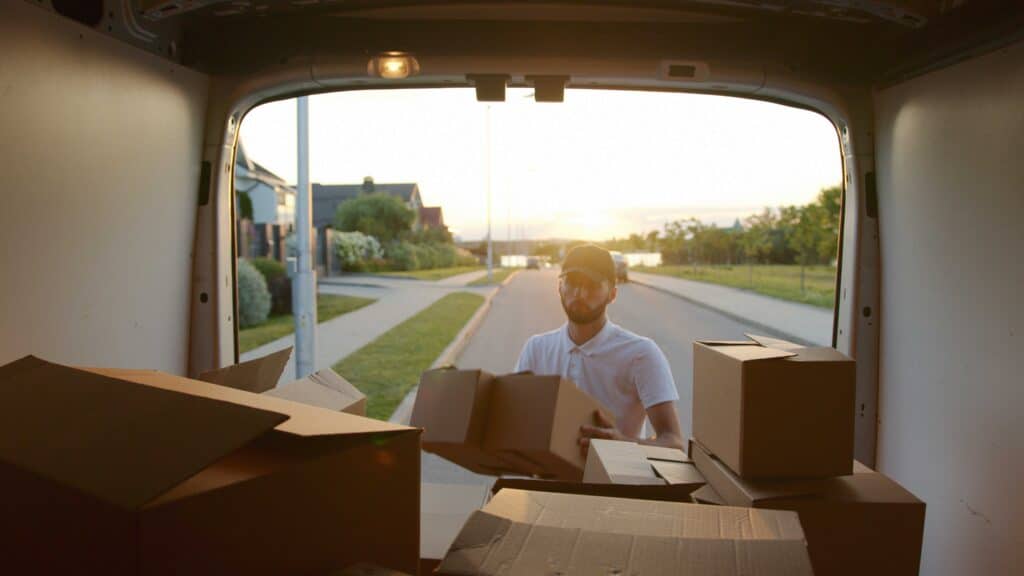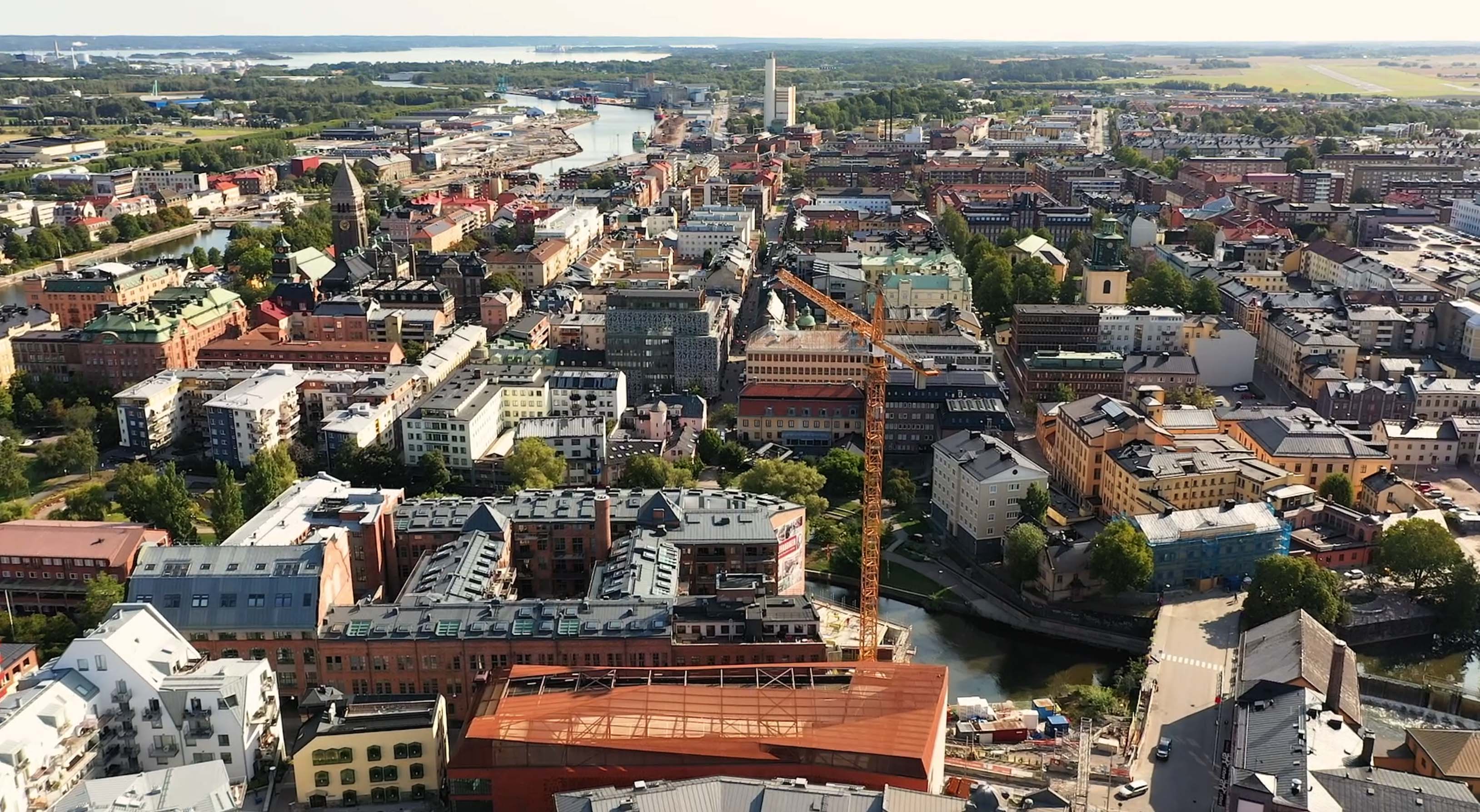Backbone of green city logistics
According to the ”Fossilfritt 2030 – Rena resan” survey in 2022, a majority of Norrköping residents wishes to decrease the space for car traffic in inner city and almost half of all respondents preferred the street space to be taken over by pedestrians, cyclists, and public transport, significantly reducing space for cars. With a new generation on the horizon and the present challenge of climate change, it is expected that the number of supporters for a car-free city will continue to grow. This trend will undoubtedly impact companies' logistics operations, particularly in last-mile deliveries.
The change is inevitable, especially considering the predicted growth of e-commerce. According to Swedish Trade’s report, e-commerce is projected to make up to 31–40% of total retail trade in 2030. For reference, in 2021, e-commerce accounted for a substantial 16% of total sales. Within the consumer goods trade, just over half of the sales can take place online. These two contrasting developments, aiming for a more sustainable city and the increasing number of vehicles on the streets, present challenges in achieving the vision for 2035.
Discussing Norrköping’s city logistics, mobility and traffic should start by discussing a vision about the ‘soul’ of the city. We probably should ask ourselves questions such as what kind of city makes liveable space for all? What kind of city motivates graduates to stay and work and what city attracts national and international talent? Or what kind of city do we want to co-create for our children and future generations? Those questions shall be addressed together with the broad-spectrum stakeholders as impact of change, positive or negative, effects all its residents, some more than others.
The Paris Climate agreement and the power of inclusion
The Paris Climate Agreement and the 2030 Sustainable Development Goals (SDGs) have become widely recognized as critical global initiatives that encouraged nations, cities, and business to take the action. The Paris Agreement marked a significant milestone by aiming to limit the global temperature rise to well below 2 degrees Celsius, the SDGs are a comprehensive set of goals and targets established by the United Nations (UN).
Unlike its predecessor, the Kyoto Protocol, which solely placed emission reduction responsibilities on developed countries, the Paris Agreement recognized that climate change is a shared challenge. It called upon all countries to set emissions targets, acknowledging the collective effort required to address this global challenge. Millennium Development Goals were criticized for not stretching far enough and lacking inclusion of engagement of various stakeholders. Contrary, Agenda 2030 aimed to include the input from a broad spectrum of identified stakeholders in order truly live up to the idea of ‘no one left behind’.
The pattern is clear, the success of initiatives aimed at creating a better place for everyone is closely tied to the principle of inclusion. By identifying and involving relevant stakeholders in the process, we increase our chances to take a collaborative and equitable approach towards solving wicked problems and city logistics inbounded in mobility and movement is one of the wicked problems that we need to solve to achieve a truly sustainable liveable space for all.
Co-creation of city logistics
Norrköping is often perceived as having a highly developed logistics infrastructure, thanks to its strategic geographical location and access to various transportation modes. However, the question that naturally arises is: what constitutes the backbone of city logistics? Is it the infrastructure for autonomous deliveries? Or is it the integration and connection of smart devices? Microhubs? Consolidations centers? Participatory design for its residents, or a combination of all these factors? Or something else?
Different stakeholders have different interests:
- Local authorities in Norrköping, are often tasked with managing and improving the overall quality of life for their residents by reducing noise and congestion.
- Transportation companies and retailers, achieving a delicate balance between cost control and service levels is critical for their business operations.
- Residents increasingly express a desire for car-reduced environments, smoother and quicker commutes, a healthier and more sustainable urban environment.
The diverse interests of stakeholders should be subject to collaborative discussion, bringing together authorities, local businesses, logistics providers, and residents. These interests are interconnected, rather than being mutually exclusive. The imperative for collaboration in shaping urban space usage is undeniable, particularly with the ongoing urban growth and increasing migration to cities, and e-commerce being on the track to take over traditional physical retail.

E-commerce
The unprecedented growth of e-commerce presents a challenge for cities in managing the influx of transportation vehicles, which directly affects sustainability and liveability of the city. To address this issue, innovative solutions must be sought that balance the convenience of e-commerce with the well-being of urban residents. While electrification of delivery vehicles is a step in the right direction, it doesn’t solve the surge in number of vehicles within the city and challenges that comes with it.
In recent years, there has been a growing emphasis on integrating green logistics and sustainable technologies into urban environments. Tools such as digitalization, Big Data analytics, robotics, autonomous solutions, Artificial Intelligence (AI), and Machine Learning (ML) have been well-established and are gradually finding their way into practical applications, driven by the pursuit of business opportunities and increased profitability. The potential for these technologies to revolutionize logistics and enabling positive urban living experience is promising. However, it is essential to acknowledge that technological innovation alone is insufficient to create sustainable cities. Realizing the full potential of these advancements requires a significant shift in behavioral patterns and engagement from various stakeholders who may be knowingly or unknowingly affected by these changes. The participation of city residents, businesses, policymakers, and community organizations will be crucial in designing and executing environmentally friendly initiatives.
Cities around the world are turning to the communities and its input to solve wicked problems with the vision to create a place people prefer to stay and live. As exemplified by the Paris Climate Agreement and Agenda 2030, the importance of transparency and inclusion in addressing complex challenges cannot be overstated.
Bringing e-commerce trade closer to the end-consumer
The ongoing discussions regarding centralized versus decentralized logistic facilities, aiming to move closer to the end consumer, could play a crucial role in shaping the future of city logistics.
Microhubs, modular hubs, lockers and consolidation centers offer potential paths towards sustainable and livable cities. In the case of microhubs and modular hubs, they can be privately owned, shared or publicly owned but their purpose and function should be defined collaboratively by a broad spectrum of stakeholders. As Norrköping aims to transition into a truly sustainable urban space for everyone, a multi-faceted approach may be necessary to determine the most suitable course of action. Furthermore, the implementation of modular microhubs could empower and foster resilient communities while creating an attractive and inclusive city.
Although the answers to the questions regarding the right course for Norrköping are yet to be fully discovered, one thing is certain: the transition to green city logistics must promote a place where people prefer to be — a city that embraces its soul and sustains a high quality of life for all, leaving no one behind.
Do you have any thoughts about how we can work together to chart the way forward? Feel free to contact us!
Darius Sarka, Project Manager
0702 – 68 48 28
darius.sarka@nosp.se
Relaterat
Vad är logistik och hur arbetar vi med klimatsmart logistik i Östergötland? Med målet att öka medvetenheten om och förståelsen för den avgörande roll som logistik spelar i samhällets hållbara framtid har vi tillsammans med Logistikia och Mats Abrahamsson, professor vid Linköpings universitet, tagit fram material som förklarar just det.
28 Apr 2023
Den 1 december får Norrköping Science Park förstärkning när Darius Sarka går in i rollen som projektledare. Darius kommer att arbeta inom vårt profilområde effektiv logistik och vi ville förstås ställa några frågor till honom inför starten.
30 Nov 2022






Följ NOSP